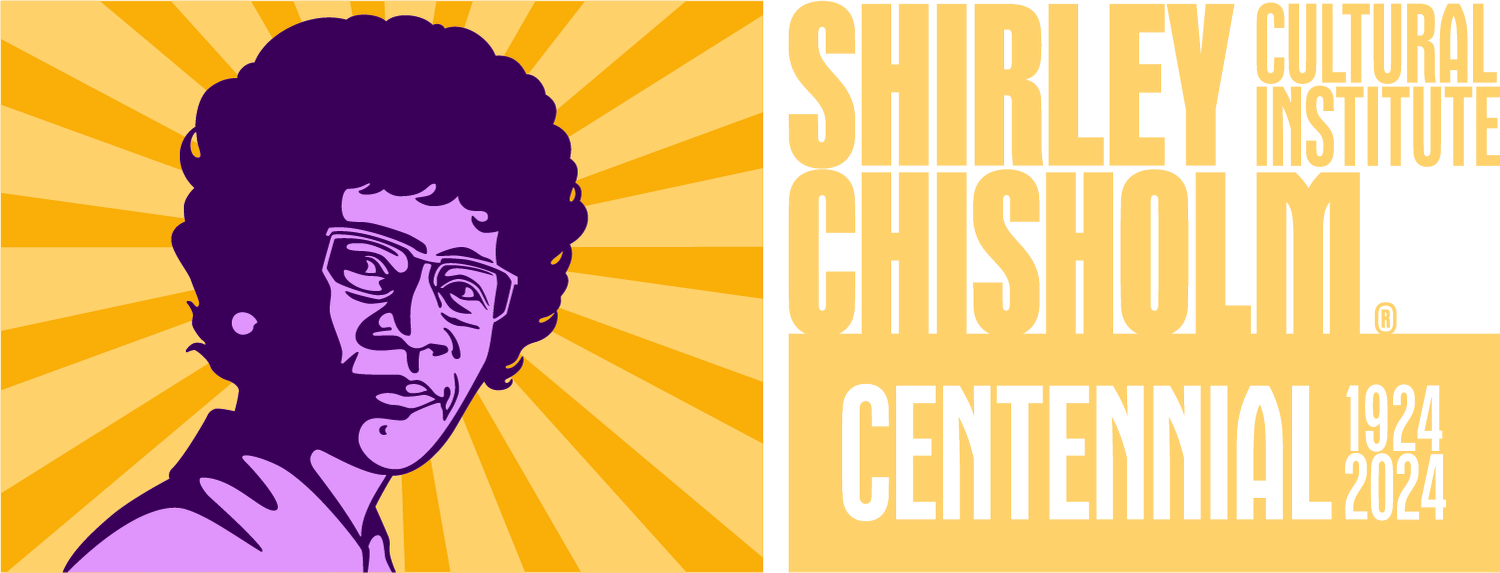November 30th declared Shirley Chisholm Day in NYC
~
~
November 30th declared Shirley Chisholm Day in NYC ~ ~
Catalyst for Change
Innovation
Activisim
Representation
Equality
Catalyst for Change Innovation Activisim Representation Equality
About the SCCI
The Shirley Chisholm Cultural Institute (SCCI) has been at the forefront of art, culture, and justice and economic sustainability since 1977, with the official permission and participation of Congresswoman Chisholm herself in its inception and development. Its purpose is to preserve the legacy of Congresswoman Shirley Chisholm through the initiatives cultivated during her public service career with 21st century activism and innovation. SCCI is aligned with grassroots groups and frontline communities through creating substantive community-based partnership and collaboration along with strategic interoperative relationships with leaders of governmental, and mainstream organizations.
Mission
The Shirley Chisholm Cultural Institute (SCCI) was first established in 1977. To provide voluntary services for children to enhance their development; provide cultural experiences to help children become more expressive, more creative and more appreciative; provide opportunities for the parent/guardians of children to be invested in enhancing the educational and cultural advancements of their children through participation and understanding; to help parents, guardians and children utilize economic, recreational and health and resources in the community; to assist in creating new resources that will lead to family stability. Chisholm depended on the Shirley Chisholm Cultural Institute, a network of women from all walks of life, to keep her in touch with the community and its concerns.
About Shirley Chisholm
-
“I am and always will be a catalyst for change.” - Shirley Chisholm
-
Shirley endorsed the Black Panther movements educational forums around the Gay Liberation Conversation
As an organizer of NOW, she worked directly with the incredible yet largely forgotten black lesbian, Pauli Murray, who has even been rejected by NOW when the gay issue became too heated.
She included a gay rights agenda in her Presidential candidacy. She was the only one to include gay and lesbian rights in her platform.
She supported the rise of Harvey Milk.
She saw the importance of the Gay Rights Movement and spoke to New York LGBT organizers about their issues after Stonewall occurred a few months after her swearing in. She said: "Unify homosexuals isolated from their own kind"; "Educate homosexuals and heterosexuals toward an ethical homosexual culture paralleling the cultures of the Negro, Mexican and Jewish peoples"; "Lead the more socially conscious homosexual to provide leadership to the whole mass"; and "Assist gays who are victimized daily as a result of oppression" (language from the 1960s/1970s)
-
Shirley voted and supported Civil Rights legislation that supported voter rights, as she believed that a person’s power as a citizen lies in their voting decisions.
-
On the issues of reproductive justice Shirley Chisholm was a visionary who anticipated the political climate of 21st century America. Some of what she dreamed about for America is just now being implemented. During her tenure, which spanned 1969 to 1983, she was extremely active, served on several key committees and helped to pass major legislation. Chisholm was ahead of her time in wanting to institute a national healthcare system that would take care of Americans from childhood to old age. Chisholm introduced a bill for a National Healthcare System as early as 1972. Chisholm not only gave a rousing speech for the Equal Rights Amendment but was one of the leading forces in its creation.
She led the way in the legislature for education and women’s health including her focus on women educators and women in the health industry. Her agenda for women’s health included abortion rights and she specifically defined each American’s private bodily rights. In 1972, she fully supported Title IX, which was headed by her very good friend Patsy Mink. This historic amendment not only ended discrimination against women’s athletics but empowered women seeking justice against sexual violence and harassment. It made progress toward gender equity in its treatment of pregnant and parenting students. Title IX was an important step in changing the lives of all women in America, but the bill was not perfect at its inception to bring about further change. Shirley spent the next four years traveling the country, speaking to university audiences to make sure they understood the importance of the bill.
-
Shirley co-wrote The Black Declaration of Independence together with Ron Dellums, Ralph Metcalfe, Charles Rangel, Bill Clay, Charles Diggs, Parren Mitchell, Louis Stokes, George W. Collins, Walter Fauntroy, Robert N.C. Nix, Sr., John Conyers and Augustus F. Hawkins.
The demands of the Black Bill of Rights were introduced in Congress on June 5, 1972. The Black Bill of Rights called for, among other items:a full-employment program, a guaranteed annual income system.
an end to American military involvement in Vietnam and all African countries.
15 percent of all government contracts for the use of black businesses so that they can develop financially.
Racial Equality – The War on Black People must end now.
A guaranteed income
Reparations
Investment in the education of the Blacks of the Nation so they can build their own rising class, that can lift this nation’s success in technology, space exploration and science.
A comprehensive plan for a universal care system, for every citizen in America, known as The National Health Insurance Program.


